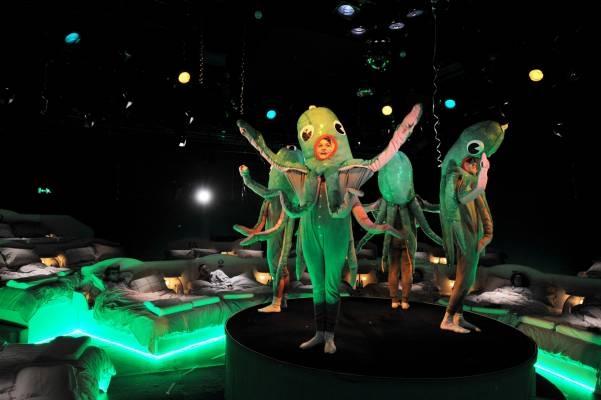There are few absolutes left in contemporary theatre. Fourth walls have long since crumbled underfoot; site-specific and immersive theatre experiences have further done away with divides between theatre and world, performer and audience. The one principle you can rely on is that consciousness is generally a good thing – that a play capable of putting you to sleep is bad. Oh, and that turning up to an opening night in your pyjamas is guaranteed to get you sent straight home again. Step forward maverick theatre company Duckie and their new show Lullaby, hoping to change all that.
In a reversal of all theatre’s ambitions to excite and provoke, stimulate and entertain, Lullaby’s sole aim is to lull its audience into slumber. To this end guests are asked to arrive at 10.30pm sharp, complete with pyjamas and toothbrush. “Check-in” is followed by a quick peruse of the breakfast menu (boiled eggs, toast, fruit) before night attire is donned and everyone shuffles their slippered way into the Barbican’s Pit Theatre to be tucked into their single, double or (ooh er) triple beds.
The Pit itself is transformed into an oneiric vision of comfort. Two rows of beds (swollen with gorgeous linens) coil concentrically around a central performance area – a sort of narcoleptic’s Big Top. Above, among the lights and technical equipment, silver helium balloons hang in the air, billowing gently like so many glossy jellyfish suspended in the ocean.
 Propped against pillows, looking around at 50 grown-ups all cuddled up obediently in their little white beds, it’s hard not to see Lullaby as more anthropological experience than theatre. Producer Simon Casson has warned of a certain giddiness that strikes people in this unusual scenario, and though it’s all very innocent fun, there are some fairly unique scenarios to be negotiated.
Propped against pillows, looking around at 50 grown-ups all cuddled up obediently in their little white beds, it’s hard not to see Lullaby as more anthropological experience than theatre. Producer Simon Casson has warned of a certain giddiness that strikes people in this unusual scenario, and though it’s all very innocent fun, there are some fairly unique scenarios to be negotiated.
While a mandatory pyjama dress code should theoretically banish any of the usual frets about what to wear to the theatre, in practice it introduces its own complex and unfathomable etiquette. If I am not a habitual pyjama-wearer should I purchase stunt pyjamas for the occasion? Is comfort really paramount, or does the presence of strangers entail some element of sartorial social responsibility? And (see question two) if the gentleman’s shorts in the next bed reveal themselves, during a night of tossing and turning, to be altogether inadequate, am I allowed to cry indecent exposure, or required to feign ignorance?
And then there’s the snoring.
The show itself, directed by Mark Whitelaw, is a gentle and fantastical creation designed to provide “dream food” for its viewers. Pitched somewhere at the junction of Salvador Dalí, In The Night Garden and Erik Satie, its four performers combine songs, dances, stories and projections to pastel and slightly surreal effect.
 We are introduced to its cast of oversized animal characters in the opening number; music-box twinklings (composer Matthew Robins’s music uses only the white notes) herald a circular parade of creatures: a rather unsteady elephant, a chicken in a bow tie and top hat, and a doll’s house complete with cotton-wool smoke emerging from its chimney.
We are introduced to its cast of oversized animal characters in the opening number; music-box twinklings (composer Matthew Robins’s music uses only the white notes) herald a circular parade of creatures: a rather unsteady elephant, a chicken in a bow tie and top hat, and a doll’s house complete with cotton-wool smoke emerging from its chimney.
Four octopuses sing a rhyming number while undertaking a stately pas de quatre, tentacles aloft. An ongoing story about a man with an imaginary family brings pathos to proceedings, and I was particularly charmed by a song about a tiger (a recurring theme through the evening) in love with the moon. As lights dim and sleep approaches the material becomes more abstract, the creatures more blurred at the edges: brief lectures on synapses and cosmology, a song about the harmony of the spheres, and finally a haunting parade of billowing underwater creatures wafted above our heads on poles.
There is a naivety to Lullaby, both in the material and its delivery. Voices drift, untrained, stories are read simply rather than declaimed. Costumes are makeshift and approximate. Yet there’s something nurturing about the combination of such polished hospitality (the smartly pyjama-clad Barbican staff are kindness itself) and such innocent theatre – it invites you to trust, to relax, to sleep. And sleep we did, once we had set aside our inner five-year-olds and their clamour for “just one more story” from Duckie’s magical storybook.













Add comment